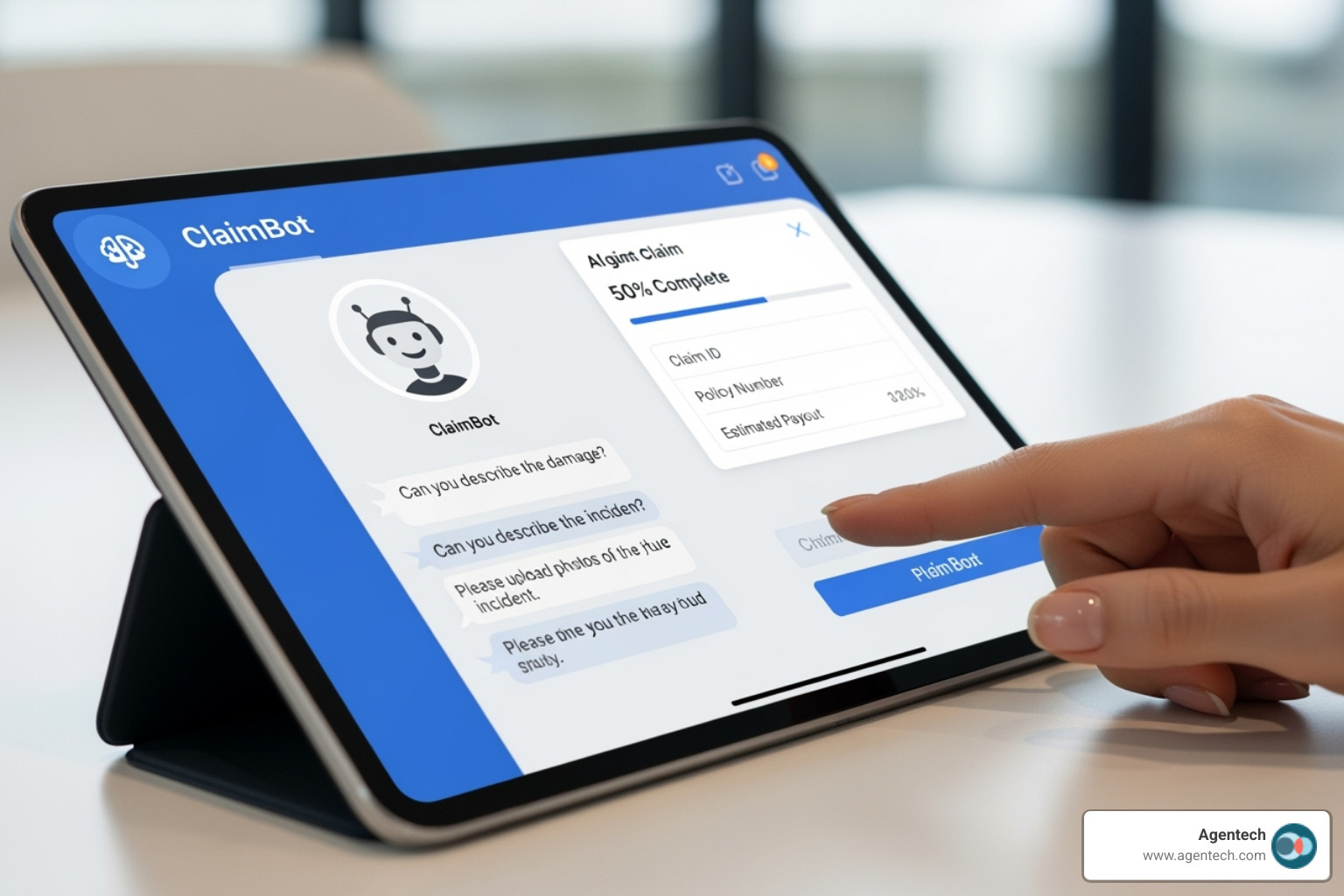The Future is Here: Artificial Intelligence Claims Processing
Artificial intelligence claims processing is rapidly changing how insurance companies operate. It's not just a buzzword; it's a powerful tool changing a historically slow, manual process into a fast, accurate, and efficient one. For insurance claims managers looking to streamline workflows and reduce "busy work," AI offers a compelling solution.
Here's how AI is reshaping the claims landscape:
- Boosts Efficiency: AI automates time-consuming tasks like document review and data entry. This drastically cuts processing times, often from weeks to mere minutes. It also frees claims handlers from repetitive, low-value work, which currently takes up about 30% of their time.
- Improves Accuracy: By minimizing human error and analyzing vast datasets, AI identifies patterns and discrepancies that humans might miss. This leads to more precise claim valuations and fewer mistakes.
- Improves Policyholder Satisfaction: With faster settlement speeds and smoother interactions, AI directly addresses a major pain point for policyholders. A significant 60% of dissatisfied policyholders cite slow settlement speed as a key issue.
- Strengthens Fraud Detection: AI's ability to spot anomalies and connect disparate pieces of information helps uncover potential fraud and identify subrogation opportunities. This protects insurers from significant financial losses, which, according to the FBI, amount to more than $40 billion a year from fraudulent claims.
Traditionally, claims processing has relied on outdated methods, leading to delays and dissatisfaction. Only a tiny fraction of claims (about 7%) can be handled without human touch using old rules-based systems. This is because most claims data is unstructured – think handwritten notes or police reports. AI steps in to solve this. It can read, understand, and integrate this unstructured data, making smarter decisions possible.
AI also offers a solution to the ongoing challenges of an aging workforce and increasing claim volumes. It allows insurers to scale operations without proportional increases in manual labor, ensuring they remain competitive and responsive.
Alex Perzold, the author, is at the forefront of this change, leading Agentech AI to build cutting-edge solutions. His deep commitment to leveraging AI for impactful and scalable solutions in the insurance industry, particularly in artificial intelligence claims processing, stems from a proven track record of building and scaling technology businesses.
The Old Way vs. The New Way: Why Traditional Automation Falls Short
For decades, the insurance industry has grappled with a claims process often characterized by stacks of paper, manual data entry, and prolonged wait times. It's a scenario that has frustrated both claims adjusters and policyholders alike. We've seen an adjuster, perhaps like one of our own, surrounded by a mountain of paperwork, tirelessly trying to make sense of disparate information. This is the reality when traditional rules-based automation, while helpful, simply isn't enough.

Traditional automation systems rely on rigid, pre-defined rules. They are excellent at handling structured data – information that fits neatly into pre-set fields or formats. However, the vast majority of insurance claims data is anything but neat. Think about police reports, medical records, handwritten notes, or even photos and videos. This is unstructured data, and rules-based systems struggle to interpret it, leading to inconsistent formats and requiring significant manual intervention.
The consequence of this limitation is stark: only 7% of claims can be ingested via straight-through processing with traditional methods. This means a staggering 93% of claims still require human touchpoints, slowing down the entire process. This inefficiency is a major hurdle in solving the insurance labor crisis.
The Limits of Rules-Based Systems
Rules-based systems, by their very nature, operate on rigid logic. If a piece of information doesn't perfectly fit a pre-programmed rule, the system can't process it. This leads to a significant inability to interpret context, which is crucial in the nuanced world of insurance claims. Imagine a system that can't understand the subtle differences in a doctor's note or the implications of a specific legal phrase in a police report. This rigidity often results in high error rates and requires constant human oversight to correct mistakes.
Furthermore, traditional systems often create data silos, where information is trapped in different departments or legacy systems, making a holistic view of a claim difficult to achieve. This lack of interconnectedness hampers efficiency and makes scalability a nightmare. When every new claim type or data format requires a complete reprogramming of rules, the system quickly becomes unwieldy and expensive to maintain. We know that up to 35% of data inaccuracies stem from human input, a challenge that rules-based systems, with their heavy reliance on manual intervention for unstructured data, struggle to overcome.
Comparing Traditional Rules-Based Automation vs. AI-Powered Automation
Feature
Traditional Rules-Based Automation
AI-Powered Automation
Data Handling
Struggles with unstructured data (images, handwritten notes).
Excels at processing both structured and unstructured data using NLP and Computer Vision.
Adaptability
Rigid, rule-based logic. Requires manual updates for new scenarios.
Learns and adapts over time, improving accuracy and handling new claim types without reprogramming.
Decision-Making
Limited to pre-defined rules. Cannot handle complex or ambiguous cases.
Provides data-driven recommendations and insights, supporting human adjusters in making more informed decisions.
Accuracy
Prone to errors from manual data entry and misinterpretation.
Significantly higher accuracy by minimizing human error and analyzing vast datasets for consistency.
Scalability
Difficult and costly to scale. Requires significant manual reprogramming.
Highly scalable, adapting to growing data volumes and new business needs with minimal manual intervention.
Frequently Asked Questions about AI in Claims Processing
How does AI improve claims accuracy?
Artificial intelligence claims processing is truly a game-changer for claims accuracy. Think of it as having an incredibly thorough, lightning-fast assistant for your data. It dives deep into vast datasets, cross-referencing information at speeds no human could ever match. This helps it identify patterns and subtle details that might easily be missed by human eyes. By automating data entry, AI dramatically slashes the chances of those pesky manual errors that can creep into traditional processes. What's more, it constantly validates information against policy rules and historical data, ensuring every outcome is consistent and precise. The result? Much more reliable and accurate claims processing.
Will AI replace claims adjusters?
It's a common question, and we're happy to say, "Absolutely not!" The goal of modern AI, especially in artificial intelligence claims processing, isn't to replace your talented claims adjusters. Instead, it's designed to augment them. Think of AI as your claims team's most efficient digital coworker. It takes on all those repetitive, administrative tasks – the kind of work that can be tedious and time-consuming. This frees up your human experts to do what they do best: focus on complex negotiations, apply crucial customer empathy, and engage in strategic decision-making where human judgment truly is irreplaceable. AI lets adjusters be more human, not less.
What is the biggest challenge when implementing AI in claims?
While AI offers incredible potential, we've found that the biggest problems in bringing it to life for claims are usually data quality and integration with legacy systems. Imagine trying to teach a brilliant student using a messy, incomplete textbook – that's what poor data quality is like for an AI model. For AI to really shine and be effective, it needs clean, comprehensive data to learn from. Then there's the challenge of making new, smart AI tools talk nicely to your older, established core systems. Ensuring seamless communication between these different technologies is absolutely crucial for a successful implementation. But with careful planning and the right partners, these challenges are definitely overcome-able!
Conclusion
The world of artificial intelligence claims processing represents more than just a technology upgrade – it's a complete change of how insurance works. We're witnessing a shift from slow, paper-heavy processes to smart, efficient workflows that actually help people when they need it most.
This isn't about robots taking over. It's about creating a better experience for everyone involved. When AI handles the tedious paperwork and data entry, claims adjusters can focus on what really matters: helping policyholders steer difficult situations with the human touch they deserve.
The benefits are clear and measurable. Operational efficiency soars when routine tasks happen automatically. Costs drop significantly when you're not spending hours on manual work that a computer can do in seconds. And customer satisfaction improves dramatically when claims that used to take weeks now get resolved in minutes.
For insurance companies, this creates a real competitive advantage. The companies that accept AI-powered claims processing today will be the ones leading their markets tomorrow. They'll be known for fast, fair, and friendly service – exactly what policyholders are looking for.
At Agentech, we understand that the best AI solutions work alongside your team, not instead of them. Our AI-powered automation tools integrate seamlessly with your existing systems, creating always-on assistants that make your adjusters more productive and effective. We believe in augmenting human expertise, not replacing it.
The future of claims processing is collaborative, intelligent, and surprisingly human. It's about using technology to bring out the best in both machines and people, creating an insurance experience that actually works for everyone.
Ready to see how AI can transform your claims operations? Find how AI Agents can revolutionize your claims operations at Agentech.




